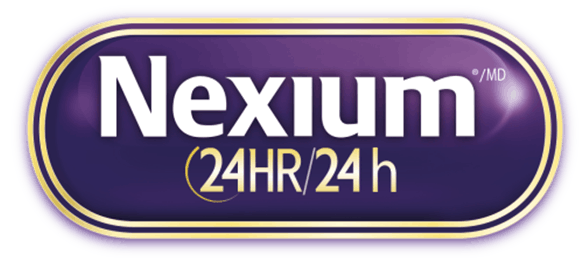TREATING FREQUENT HEARTBURN
Heartburn and other symptoms of gastroesophageal reflux disease (GERD) are common. Some heartburn sufferers have frequent heartburn.
There are a number of treatment options available for treating heartburn, and the appropriate choice for each patient should be based on a number of relevant factors including severity and frequency of presenting symptoms, prior treatment response, and comorbid medical conditions.
Left untreated, chronic frequent heartburn can lead to potentially serious conditions including esophagitis, Barrett’s esophagus, strictures, and esophageal cancer.
RECOMMENDING A TREATMENT
The 2013 World Gastroenterology Organization guideline for community-based treatment of common GI symptoms recommends that for patients presenting with frequent heartburn (≥2 days/week), OTC proton pump inhibitor (PPI) once daily for 14 days in addition to lifestyle modifications should be considered as first-line therapy.
MANAGING FREQUENT HEARTBURN
Patient presents with heartburn ≥2days/week
Recommend lifestyle modification plus OTC PPI 1x/day for 14 days
Problem
Resolved
May repeat every 4 months as needed
Problem
Unresolved
Refer to a physician for assessment & diagnosis
ONE BENEFIT OF PPIS AS FIRST-LINE THERAPY FOR FREQUENT HEARTBURN
IS THE LONG-LASTING RELIEF THEY PROVIDE.
Antacids
Duration
Up to 2 hours
Mode Of
Action
Neutralizes acid
Alginates
Duration
Up to 4 hours
Mode Of
Action
Creates a barrier over stomach contents
H2 Blockers
Duration
Up to 12 hours
Mode Of
Action
Blocks some acid production
PPIs
Duration
Up to 24 hours
Mode Of
Action
Suppresses acid production
WHY RECOMMEND NEXIUM 24HR?
Omeprazole, the first PPI, was developed as a single optical isomer, with 50% in S-isomer and 50% in R-isomer. Esomeprazole, the active ingredient in Nexium 24HR, contains 100% S-isomer, which is more bioavailable than the R-isomer. Nexium 24HR (esomeprazole 20mg) was demonstrated to provide more consistent acid control and for ≥2 hours longer duration compared with omeprazole at the equivalent dose in a double-blind, crossover study.
Nexium 24HR is the #1 recommended OTC PPI among Canadian physicians and pharmacists.*
*2024 IQVIA ProVoice Survey for OTC PPIs.
LIFESTYLE MODIFICATIONS
Recommending the following lifestyle modifications can also help patients manage their heartburn.
Avoid foods and beverages that are likely to trigger heartburn.
Common culprits include:
- Spicy foods
- Fatty or fried foods
- Onions
- Citrus products
- Tomato products (including ketchup)
- Peppermint
- Chocolate
- Alcohol
- Carbonated beverages
- Caffeinated beverages
- Reduce the size of the portions you eat.
- Wait 3 hours after eating before lying down to sleep.
- Sleep on an incline by raising the torso on a wedge.
- Wait 2 hours after eating before engaging in exercise.
- Avoid tight-fitting clothing around the abdomen.
- Do not smoke. Smoking weakens the lower esophageal sphincter, the muscle that keeps the stomach contents from flowing back into the esophagus.
- Being overweight can trigger heartburn. If appropriate, counsel the patient on healthy weight management strategies.
SAFETY & TOLERABILITY
The safety and tolerability of Nexium 24HR is well established, and most adverse effects are mild and transient in nature.
Patients should be counselled to take 1 capsule with a glass of water before eating in the morning, every day for 14 days. Capsules should not be chewed or crushed. If necessary, treatment may be repeated in 4 months.
Nexium 24 HR is not recommended for concomitant use with certain antiviral drugs or drugs that are affected by gastric pH changes. Consult the product monograph for a complete review of the safety information.
WARNING SIGNS TO WATCH FOR
When counseling patients on heartburn management, it is important to watch for warning signs that require medical evaluation.
These red flags include:
- Chest pain
- Difficult/painful swallowing
- Family history of esophageal adenocarcinoma
- Epigastric mass/lymphadenopathy
- Gastrointestinal bleeding
- Iron deficiency anemia
- New onset of symptoms >50 years of age
- Recurrent cough/hoarseness
- Vomiting

